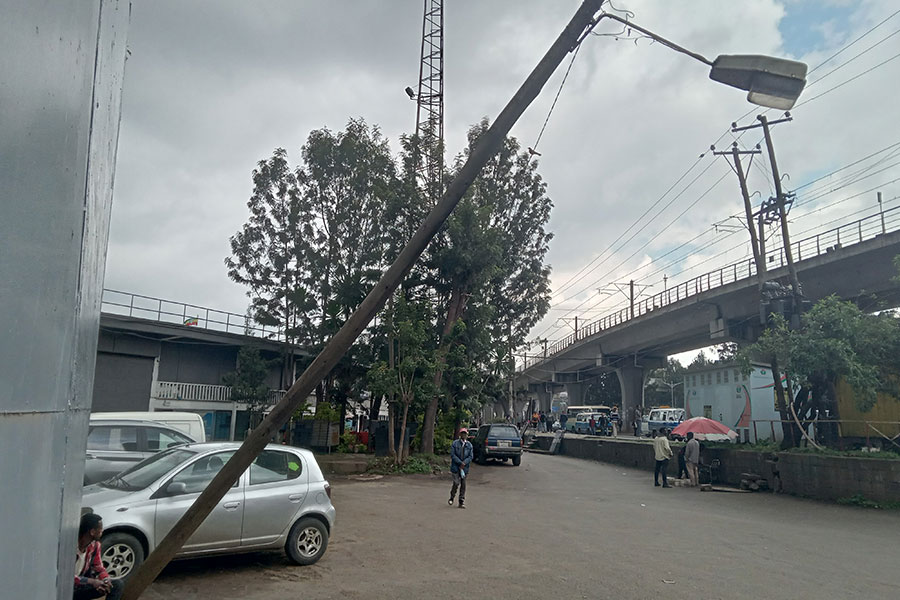
Mar 27 , 2021
By Carolyn Kissane
Some of us would think that a person is most likely to get help when others are present. It is actually the opposite, and the culprit is the phenomenon known as "the bystander effect." Popularised by social psychologists Bibb Latane and John Darley, two factors are attributed to this concept.
Primary is the diffusion of responsibility. Each person present thinks the other would extend help and wait on other bystanders to take action; therefore, avoiding personal responsibility to act. Had it been a single person present, then they would not have hesitated as much to take action as they would feel solely accountable. The other factor is social influence – not knowing what to do or how to act in the face of others' lack of action. Seeing that nobody is doing anything to help the individual in distress keeps others from intervening.
The bystander effect, as in many societies, is a significant problem in Ethiopia. I see it every day. There is that person who cares enough to take action or do her part while everybody else goes about their day.
Take households. One parent, usually the mother, does most of the housework and the caring for her children. In our workplaces, there is usually one employee that does their work beyond and above the call of duty, even though she is not properly compensated for her hard work, and several others who slack on the job.
In our neighbourhoods, there is that outspoken person bothering everyone with issues of littering, water shortages or neighbourhood security. They usually come off as sticking their noses in other people’s business.
There is an Amharic saying, "Ye fukikir bet sayzega yaderal," roughly translated to “Negative competition over who should close the door between residents will leave the door open.” It indicates that leaving the job for whomever to step in and do it will leave it undone.
Why can we not do it ourselves? Why do we wait for someone else to do it for us?
When we come across something that needs fixing, we should take the initiative to fix it. We can start in our households. For instance, in many households, if there is trash that needs to be put into a garbage can, dishes to be washed or beds to be made, we usually wait for either the maid (if there is one) or another family member to do it. This is a common practice that extends to other areas of our lives.
The mentality of “Why would I go through the trouble of doing it while I have other important things to do?” is dangerous. It makes us lazy and incapable. The problem of responsibility avoidance or diversion also has its roots in procrastination. People who tend to wait for others to take action instead of taking it themselves are procrastinators.
Another factor related to the bystander effect is the lack of delegation. Some people, myself included, are not good at delegating tasks to others as we think they cannot do it the way we want it or how we think it should be done. If people would just transfer responsibilities to others and let them be, then the procrastinators would somehow step up as there would be no one else to take responsibility.
Sometimes it is imperative to not act in order to let others take responsibility; that way, they learn not to wait on other people – a taste of their own medicine. This may come as a contradiction, but it is one way of teaching a lesson to those people who often avoid the responsibility of taking action. Then they would realise that they are on their own and feel obligated to take action. However, this is hoping that it will not create a vicious cycle where this action, done repeatedly, makes it favorable for the person who often takes responsibility to lay off accountability and get reluctant.
PUBLISHED ON
Mar 27,2021 [ VOL
21 , NO
1091]


Viewpoints | Jan 18,2020

Life Matters | May 29,2021


Letter To Editor | Apr 18,2023

Sunday with Eden | Nov 23,2024

My Opinion | Oct 07,2023

Viewpoints | Aug 23,2025

Sunday with Eden | Dec 11,2020

In-Picture | Aug 18,2024

Fortune News | May 11,2024

Photo Gallery | 173758 Views | May 06,2019

Photo Gallery | 163984 Views | Apr 26,2019

Photo Gallery | 154032 Views | Oct 06,2021

My Opinion | 136571 Views | Aug 14,2021
Editorial | Oct 11,2025

Dec 22 , 2024 . By TIZITA SHEWAFERAW
Charged with transforming colossal state-owned enterprises into modern and competitiv...

Aug 18 , 2024 . By AKSAH ITALO
Although predictable Yonas Zerihun's job in the ride-hailing service is not immune to...

Jul 28 , 2024 . By TIZITA SHEWAFERAW
Unhabitual, perhaps too many, Samuel Gebreyohannes, 38, used to occasionally enjoy a couple of beers at breakfast. However, he recently swit...

Jul 13 , 2024 . By AKSAH ITALO
Investors who rely on tractors, trucks, and field vehicles for commuting, transporting commodities, and f...

Oct 11 , 2025
Ladislas Farago, a roving Associated Press (AP) correspondent, arrived in Ethiopia in...

Oct 4 , 2025
Eyob Tekalegn (PhD) had been in the Governor's chair for only weeks when, on Septembe...

Sep 27 , 2025
Four years into an experiment with “shock therapy” in education, the national moo...

Sep 20 , 2025
Getachew Reda's return to the national stage was always going to stir attention. Once...

Oct 12 , 2025
Tomato prices in Addis Abeba have surged to unprecedented levels, with retail stands charging between 85 Br and 140 Br a kilo, nearly triple...

Oct 12 , 2025 . By BEZAWIT HULUAGER
A sweeping change in the vehicle licensing system has tilted the scales in favour of electric vehicle (EV...

Oct 12 , 2025 . By NAHOM AYELE
A simmering dispute between the legal profession and the federal government is nearing a breaking point,...

Oct 12 , 2025 . By NAHOM AYELE
A violent storm that ripped through the flower belt of Bishoftu (Debreziet), 45Km east of the capital, in...